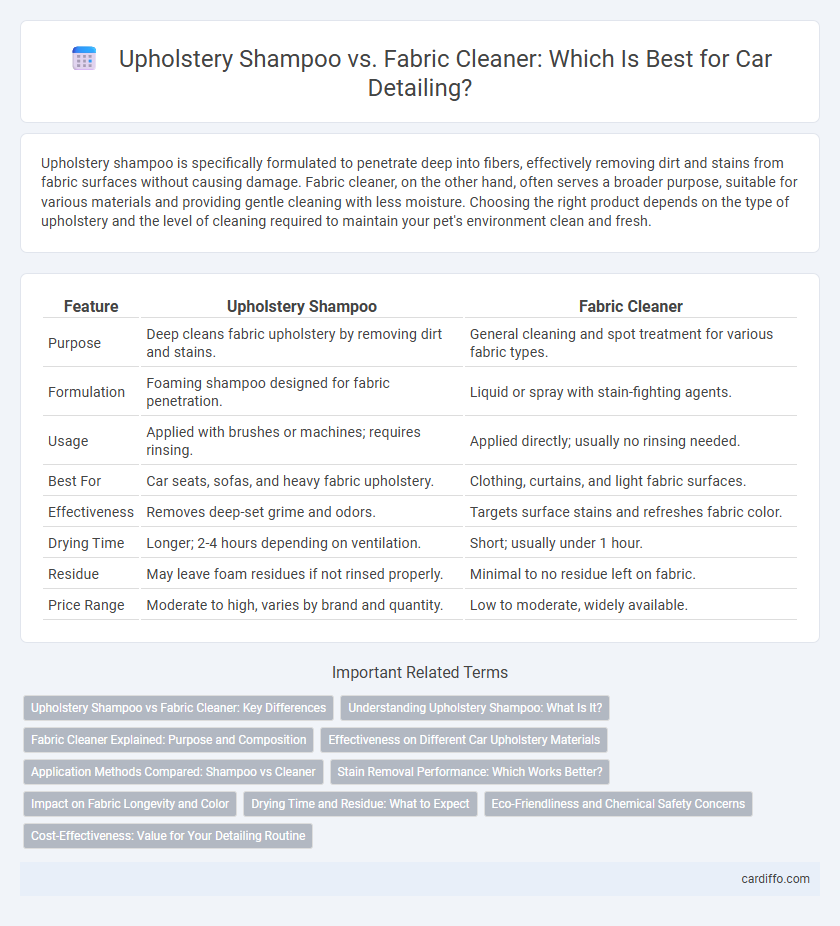Upholstery shampoo is specifically formulated to penetrate deep into fibers, effectively removing dirt and stains from fabric surfaces without causing damage. Fabric cleaner, on the other hand, often serves a broader purpose, suitable for various materials and providing gentle cleaning with less moisture. Choosing the right product depends on the type of upholstery and the level of cleaning required to maintain your pet's environment clean and fresh.
Table of Comparison
| Feature | Upholstery Shampoo | Fabric Cleaner |
|---|---|---|
| Purpose | Deep cleans fabric upholstery by removing dirt and stains. | General cleaning and spot treatment for various fabric types. |
| Formulation | Foaming shampoo designed for fabric penetration. | Liquid or spray with stain-fighting agents. |
| Usage | Applied with brushes or machines; requires rinsing. | Applied directly; usually no rinsing needed. |
| Best For | Car seats, sofas, and heavy fabric upholstery. | Clothing, curtains, and light fabric surfaces. |
| Effectiveness | Removes deep-set grime and odors. | Targets surface stains and refreshes fabric color. |
| Drying Time | Longer; 2-4 hours depending on ventilation. | Short; usually under 1 hour. |
| Residue | May leave foam residues if not rinsed properly. | Minimal to no residue left on fabric. |
| Price Range | Moderate to high, varies by brand and quantity. | Low to moderate, widely available. |
Upholstery Shampoo vs Fabric Cleaner: Key Differences
Upholstery shampoo is specifically formulated to clean and refresh fabric on furniture by penetrating deep into fibers to remove dirt, stains, and odors without causing damage. Fabric cleaner, on the other hand, often comes as a general-purpose solution designed for various textiles, which may not be as effective or safe on delicate upholstery materials. Choosing upholstery shampoo ensures targeted cleaning with optimized pH levels and ingredients tailored to maintain fabric integrity, while fabric cleaners risk discoloration or residue buildup on upholstered surfaces.
Understanding Upholstery Shampoo: What Is It?
Upholstery shampoo is a specialized cleaning solution designed specifically for deep-cleaning fabric-covered furniture by removing embedded dirt, stains, and odors without damaging delicate fibers. Unlike general fabric cleaners, upholstery shampoos contain surfactants and detergents formulated to lift grime while preserving the texture and color of materials such as microfiber, velvet, and cotton blends. Regular use of upholstery shampoo enhances the longevity and appearance of upholstery by maintaining fabric integrity and preventing mold or mildew buildup.
Fabric Cleaner Explained: Purpose and Composition
Fabric cleaner is specifically formulated to remove dirt, stains, and odors from various types of upholstery materials without causing damage or discoloration. It typically contains mild surfactants, solvents, and enzymes designed to break down organic and inorganic contaminants while preserving the fabric's texture and color. Unlike upholstery shampoo, which creates foam for deep cleaning, fabric cleaner often works through a low-foam or no-rinse formula suitable for delicate and diverse fabrics.
Effectiveness on Different Car Upholstery Materials
Upholstery shampoo is highly effective on natural fibers like cotton and wool, providing deep cleaning that lifts dirt and stains without damaging the material. Fabric cleaners, often formulated with specific solvents or enzyme-based agents, excel in treating synthetic materials such as polyester and nylon by breaking down oils and embedded grime. Selecting the appropriate product based on upholstery type ensures optimal stain removal and fabric preservation during car detailing.
Application Methods Compared: Shampoo vs Cleaner
Upholstery shampoo is typically applied with a foaming brush or machine, allowing deep penetration into fabric fibers for thorough dirt and stain removal, followed by vacuum extraction or blotting to dry. Fabric cleaner often comes in spray or liquid form, enabling targeted spot treatment and quicker drying times with minimal moisture application. Both methods require agitation to loosen contaminants, but upholstery shampoo is better suited for extensive cleaning, while fabric cleaners excel in on-the-spot maintenance.
Stain Removal Performance: Which Works Better?
Upholstery shampoo excels in deep cleaning and removing ground-in dirt and stains due to its foaming action and detergents specifically formulated for fabric fibers. Fabric cleaners often offer targeted stain removal with enzymatic or solvent-based formulas, making them highly effective on specific stains like grease or ink without saturating the fabric. For overall stain removal performance, upholstery shampoo provides a more thorough clean for widespread dirt, while fabric cleaner delivers superior results on isolated, stubborn stains.
Impact on Fabric Longevity and Color
Upholstery shampoo effectively removes deep-seated dirt and stains, helping to maintain fabric texture and prolong longevity by preventing fiber deterioration. Fabric cleaner, designed for gentle spot treatment, preserves the vividness of colors by minimizing chemical exposure and reducing the risk of fading. Using the appropriate product based on fabric type ensures optimal care, enhancing both durability and color retention over time.
Drying Time and Residue: What to Expect
Upholstery shampoo typically requires longer drying times due to its thicker formula, which can leave behind residue if not thoroughly extracted, potentially causing fabric stiffness or discoloration. Fabric cleaners, designed for quicker evaporation, generally dry faster and minimize residue buildup, preserving fabric softness and appearance. Choosing products with low-moisture or no-rinse formulas can significantly reduce drying time and the risk of residue on upholstery surfaces.
Eco-Friendliness and Chemical Safety Concerns
Eco-friendly upholstery shampoos are formulated with biodegradable ingredients that minimize environmental impact and reduce exposure to harmful chemicals. Fabric cleaners often contain strong solvents and synthetic agents that can pose health risks and contribute to indoor air pollution. Choosing plant-based upholstery shampoos supports both chemical safety and sustainable cleaning practices in vehicle and furniture detailing.
Cost-Effectiveness: Value for Your Detailing Routine
Upholstery shampoo offers deep cleaning power ideal for heavily soiled furniture, often requiring more product and effort, which increases overall cost per use. Fabric cleaners are typically more cost-effective for regular maintenance, requiring less product and quicker application, making them suitable for frequent touch-ups in detailing routines. Choosing between the two depends on balancing intensity of cleaning needed against budget constraints and frequency of use.
Upholstery shampoo vs Fabric cleaner Infographic

 cardiffo.com
cardiffo.com